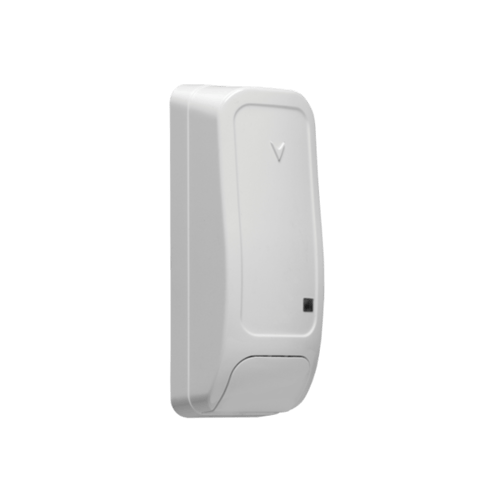Professional grade door and window sensor with encrypted wireless communication so your security system doesn’t get hacked. Selectable operation of auxiliary input as NO, NC or EOL supervision. PowerG encrypted technology protects wireless signal. Works with all IQ Panel 4 systems with a PowerG radio, including the IQP4001.
| Manufacturer | DSC |
| Part number | PG9945 |
| Dimensions | 3.19 x 1.25 x 1 inches |
| Wireless signal range | 2000-2500ft in open air |
| Signals | Alarm, alarm restore, tamper, tamper restore, low battery |
| Transmitter frequency | USA: 912-919 MHz |
| Wireless protocol | PowerG |
| Battery life | 8 years (with typical use) |
| Operating Temperature | -10°C to 55°C (32°F to 122°F) |
| Storage Temperature | -40-80C |
| Battery | 3V Lithium CR123A |
How to install the PG9945
Physical installation of the DSC PG9945 Door Window Contact Sensor sensor should follow the manufacturer’s instructions found in the product installation manual. Installation steps from the PG9945 manual are below:
A link to the PG9945 full manual can be found here:
Mounting the PG9945
- Choose Installation Location. This sensor works best for Sliding Glass Doors, Garage Doors, Windows, Exterior Doors, Interior Doors, Medicine Cabinets, and Gun Safes.
- Open sensor and insert battery.
- Wire Auxiliary input (if in use).
- Apply Adhesive Mounting Tape to back of sensor and magnet.
- Line Up Sensor and Magnet using the Magnet Locator Mark on the Sensor.
- Secure Sensor and Magnet with the Adhesive Mounting Tape to the installation location. Magnetic Gap should not exceed 0.24".
Programming the PG9945
- Place the IQ Panel into Learn Mode. To do so, at the panel navigate to:
- Settings
- Advanced Settings
- Enter your Installer or Dealer Code
- Installation
- Devices
- Security Sensor
- Add Sensor
- Select Source: PowerG then manual enter the Sensor ID
- Program the sensor as needed. Then Click Add to finalize programming.
- Repeat these steps for Sensor Input Reed Switch and Auxiliary
Programming for PowerG sensors like the DSC PG9945 can be found here:



